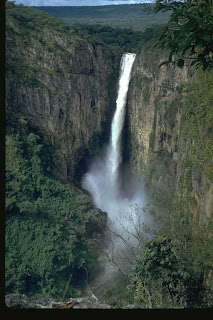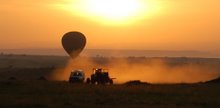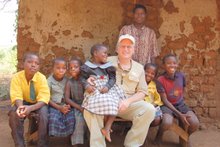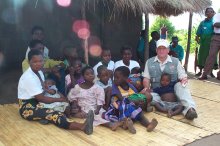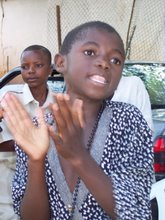But I will tell you how I got there and why it is worth the trip in a moment.
Go back a few days. I flew from Johannesburg; SA to Victoria Falls, Zimbabwe and checked into the Victoria Falls Hotel. It is my favorite hotel in the whole world with its amazing views of the falls and its long history. Had “afternoon tea” on the terrace, an evening river cruise on the Zambezi River and a traditional boma (dinner of local wild game and dancing) before overnighting at the hotel. After a walking tour of the falls from the Zimbabwe side I walked across the bridge into Zambia, had lunch at Zig Zag Cafe and caught the next flight to Lusaka and a charter flight to Kasama. In Kasama I stayed at the Thorn Tree Guest House and the next day had a two hour drive north to Mbala and on to Mpulungu on Lake Tanganyika.
At Mpulungu, Zambia’s only port, I caught a boat for the one hour trip to Isanga Bay Lodge on the shores of Lake Tanganyika. The boat is capable of carrying 8 adults plus luggage and your vehicle can be parked with no charge, at Mpende Fisheries.
Isanga Bay Lodge http://www.isangabay.com/ sits on an expansive white beach shaded with palm trees overlooking the bay and at night you can see dozens of small fishing boats, illuminated with lights, as they prowl their favorite fishing spots. You will see their catch the next day all along the lake front as they fish dry in the sun.
The lodge offers exceptional friendly hospitality at this off the beaten track, a gem in the heart of remote Africa.
The next morning I set out at 7:10 AM for a 10 minutes boat ride to Myamba Village, near to where the Kalambo River empties into Lake Tanganyika. As the children see the boat approaching they long along the beach and into the water yelling, “Baba, (father) give me money, please.” Resist the temptation wherever you are in Africa as it only encourages more begging.
I departed the village at 7:25 AM with my guide (provided by the lodge) and wandered through the village and an overgrown soccer field and began a very slight uphill climb. I thought to myself, “this isn’t so bad.” Don’t kid yourself the real climbing is just ahead.Also, as I discovered after making the reservations at the lodge, you cannot reach the bottom of the falls by beginning at the mouth of the river and working your way up the river. I am told that climb is impossible. While the gorge is up to 1 km with a depth of 300 m it is too steep and rocky to reach the actual bottom of the falls. You will only see the falls from the top.
Back to the climb. Soon I was climbing, what seems to be straight up. Up and over giant rocks and boulders on a very narrow but well worn path, hard hand over hand climbing as you work your way further and further from the lake. I reached the top of the escarpment at 8:10 AM after a 45 minutes climb. The views looking back toward the lake and the village are breathtaking and it gave me a real sense of accomplishment. I was most grateful for the friend in Mbala who had prepared a walking stick for me. I had to ignore the women, with baskets of fish on the head, climbing right past me.Once I reach the escarpment I had a long walk through cassava fields and reached the western view of the falls at 9:05 AM (total climbing time: 45 minutes to the top of the escarpment and 55 minute walk through the fields. It was about another 10 minute walk to the edge of the falls. Here the river forms a large pool before dropping off 772 feet into the ravine below.
Did I say pack plenty of water? I quickly ran out of the water I was carrying and thankful my guide was carrying more.
The falls is one of the tallest uninterrupted falls in Africa (after South Africa's Tugela Falls, Ethiopia's Jin Bahir Falls and some more waterfalls).
Once you reach the falls a park attendant appears from nowhere to collect the park fee.
I quickly hired another guide to take me across the river, above the falls, into Tanzania. I stripped down to my skivvies and entered the river just above the falls. I was so thankful for the strength of my guide as I began to lose control in the swift water. He grabbed my arm, and like giant pneumatic wench pulled me up and across. I wandered around the Tanzania side of the falls, without a visa, for a short time and then made the treacherous swim back to the Zambia side and then the long decent back to the lake. It took much longer going down, 2 hours and 10 minutes) then going up.
In the village of Myamba I met with the headman, Jerald and gave him money the buy pencils and notebooks for the children of the village and told him I hoped he would prohibit the children from begging. He said he didn’t like it but that the tourists did.
That afternoon after returning to the lodge and a hot shower and good meal it was back to Mpulungu and Mbala for an overnight stay at Lake Chila Lodge. The next day I flew a charter out of the Zambian Air Force base to Mfuwe, in the southeast part of Zambia and to Mfuwe Lodge and a couple of days viewing game in South Luangwa National Park.
If you are thinking about a trip to Kalambo Falls and Isanga Bay Lodge and you have any questions please contact me at Larryvan47@aol.com.
